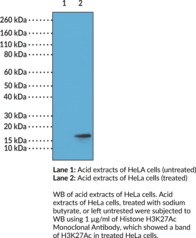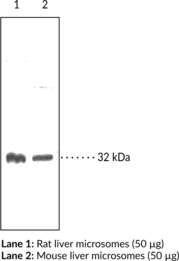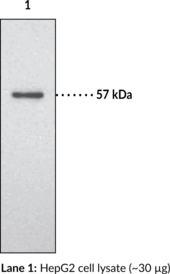Description
Histone H3 is a nuclear protein and a component of the nucleosome core, a basic unit of chromatin, that is essential for organizing genomic DNA in eukaryotic nuclei.{57056} It is a globular protein that contains an unstructured N-terminal tail that extends outside of the nucleosome core and is subject to various post-translational modifications (PTMs), including methylation, phosphorylation, acetylation, and citrullination.{57056,53978} Acetylation of histone H3 at lysine 27 (H3K27Ac) is associated with active gene transcription.{46252} H3K27 acetylation and H3K4 monomethylation are enriched near active enhancers, and H3K27 acetylation and H3K4 trimethylation together mark transcription start sites of actively transcribed genes. Increased tumor H3K27Ac levels have been found in patients with breast cancer.{54329} Cayman’s Histone H3K27Ac Monoclonal Antibody can be used for ELISA, immunocytochemistry (ICC), multiplex-based assay, and Western blot (WB) applications.
Synonyms: Acetylated Histone H3 Lysine 27
Immunogen: Peptide corresponding to H3K27Ac
Formulation: 100 µg of protein A-affinity purified monoclonal antibody
Isotype: IgG
Applications: ELISA, ICC, multiplex-based assays, WB
Origin:
Stability: 365 days
Application|ELISA||Application|Immunocytochemistry||Application|Multiplex||Application|Western Blot||Product Type|Antibodies|Monoclonal Antibodies||Research Area|Epigenetics, Transcription, & Translation|Erasers|Histone Deacetylation||Research Area|Epigenetics, Transcription, & Translation|Histones/Histone Peptides|Acetylated||Research Area|Epigenetics, Transcription, & Translation|Writers|Histone Acetylation




